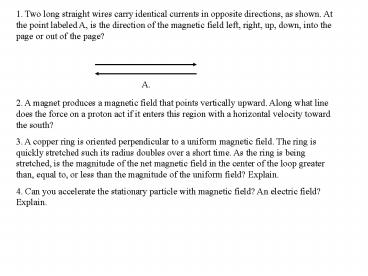Light: Geometric Optics - PowerPoint PPT Presentation
1 / 30
Title:
Light: Geometric Optics
Description:
The ray model of light assumes that light travels in straight-line path called rays. ... ray 3 is chosen to be perpendicular to the mirror, and so is drawn so that it ... – PowerPoint PPT presentation
Number of Views:184
Avg rating:3.0/5.0
Title: Light: Geometric Optics
1
1. Two long straight wires carry identical
currents in opposite directions, as shown. At the
point labeled A, is the direction of the magnetic
field left, right, up, down, into the page or out
of the page?
A.
2. A magnet produces a magnetic field that points
vertically upward. Along what line does the force
on a proton act if it enters this region with a
horizontal velocity toward the south? 3. A copper
ring is oriented perpendicular to a uniform
magnetic field. The ring is quickly stretched
such its radius doubles over a short time. As the
ring is being stretched, is the magnitude of the
net magnetic field in the center of the loop
greater than, equal to, or less than the
magnitude of the uniform field? Explain. 4. Can
you accelerate the stationary particle with
magnetic field? An electric field? Explain.
2
Light Geometric Optics
3
The Ray Model of Light
4
The ray model of light assumes that light travels
in straight-line path called rays.
5
(No Transcript)
6
Reflection
7
For flat surfaces, it is found that the incident
and reflected rays lie in the same plane with the
normal to the surface.
8
Law of Reflection
The angle of incidence equals the angle of
reflection.
9
(No Transcript)
10
Diffuse reflection
Specular reflection
11
Image Formation by a Plane Mirror
12
(No Transcript)
13
For a plane mirror the image distance (distance
from mirror to image) equals the object distance.
14
Real and Virtual Images
15
How tall must a full-length mirror be? A woman
1.60m tall stands in front of a vertical plane
mirror. What is the minimum height of the mirror,
and how high must its lower edge be above the
floor, if she is to be able to see her whole
body? Assume her eyes are 10 cm below the top of
her head).
16
(No Transcript)
17
Formation of Images by Spherical Mirrors
18
(No Transcript)
19
For an object infinitely far away (the sun or
starts), the rays would be precisely parallel.
20
(No Transcript)
21
If a mirror is small compared to its radius of
curvature, so that the reflected rays make only a
small angle upon reflection, then the rays will
cross each other at a single point, or focus.
22
The principal axis of a mirror is defined as the
straight line perpendicular to the curved surface
at its center.
23
The point F, where the rays parallel to the
principal axis, come to a focus, is called the
focal point of the mirror.
24
The distance between focal point and the center
of the mirror is called the focal length, f, of
the mirror.
25
Another way of defining the focal point is to say
that it is the image point for an object
infinitely far away along the principal axis.
26
Finding the Image Position for a Curved Mirror
27
- ray 1 is drawn parallel to the axis therefore it
must pass along a line through F - ray 2 is drawn through F, as result is must
reflect into parallel to the principal axis ray - ray 3 is chosen to be perpendicular to the
mirror, and so is drawn so that it passes through
C, the center of curvature it will be reflected
back on itself.
28
Mirror Equation
29
The lateral magnification, m, of a mirror is
defined as the height of the image divided by the
height of the object
30
The Sign Convention
- the image height hi is positive if the image is
upright, and negative if inverted, relative to
the object - di and do are both positive if image and object
are on the reflecting side of mirror, but if
either image or object are behind the mirror, the
corresponding distance is negative.



























![L 32 Light and Optics [3] PowerPoint PPT Presentation](https://s3.amazonaws.com/images.powershow.com/7515468.th0.jpg?_=20210330103)



